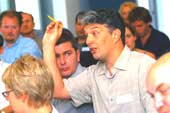|
|
Our Nobel Mantrich training programs
are designed and taught by accredited trainers who are impassioned
experts with outstanding credentials and leading authorities in
their respective fields. As board members, consultants, field
researchers, and entrepreneurs themselves, they have an immeasurable
wealth of real-world expertise. They also are recognised experts in
family business, strategy, global marketing, services marketing and
strategic marketing issues—and maintain relationships with leading
companies and industry leaders around the world.
Nobel Mantrich Trainers possess rare
insight into owning and running a business because most of them have
been through the experience themselves. And, all have been carefully
chosen for their proven abilities to work with company owners and
CEOs. As a participant, you have the opportunity to draw upon their
experience and discuss relevant topics with them in-depth.
Nobel Mantrich leverages their business
expertise and field-based research to create new knowledge and
enduring concepts that shape the practice of management. The result
is a trainer and facilitator that exposes participants to uniquely
different perspectives and challenges their thinking on multiple
levels.
Up | Down | Top | Bottom
|
|
|
Read More on:
Practical Training
Practical Training
Close Box 1
 It
is very
important
that for management concepts to be effective for the manager and
leader, they must be expressed
in terms that are understandable
and
usable. Part of the criticism of management training is
that many of the approaches and
tools taught are
out
of touch
with
the local context and local reality in which the course is
taught and that most people cannot
begin to apply them to their
job situations. It
is very
important
that for management concepts to be effective for the manager and
leader, they must be expressed
in terms that are understandable
and
usable. Part of the criticism of management training is
that many of the approaches and
tools taught are
out
of touch
with
the local context and local reality in which the course is
taught and that most people cannot
begin to apply them to their
job situations.
Embedding Knowledge, Practice & Attitude
Embedding of Knowledge, Practice and Attitude
Close Box 2

It was once said that if you want to teach people the skills of
management, marketing and strategy, don't bother trying to teach
them. Instead, give them a tool, the use of which will lead to new
ways of managing and leading. However, with no underlying theory, we
may not always appreciate the limitations of a tool, or even its
counter productiveness if used inappropriately.
A case in point which we have met in many private and public
companies is the implementation of quality management systems,
performance appraisals, training programmes, IT systems, quality
awareness seminars, job descriptions, marketing promotions, employee
suggestions schemes and employee incentive programmes, among others.
We have seen many companies implement these tools, systems and
initiatives without addressing carefully, openly and systematically
the real issues facing their organisations. In the process, one
would be throwing huge amounts of money down the drain and worse
still, eroding the confidence of employees for any new
groundbreaking market penetration initiatives.
Customising & Localising
Customising and Localising
Close Box 3
 In
our rush to solve practical problems, we may grab at ready made
solutions that neither address the fundamental causes of a problem,
nor stretch our thinking in important new directions. To avoid this
occurrence, it is necessary to avoid standardisation of teaching and
to adapt learning as much as possible to the needs of participants
by means of real, relevant and local examples, workshops and case
studies that participants can relate to. In this way, they will be
able to apply the knowledge learnt to their local situation and
translate new ideas into new practices at their workplace. In
our rush to solve practical problems, we may grab at ready made
solutions that neither address the fundamental causes of a problem,
nor stretch our thinking in important new directions. To avoid this
occurrence, it is necessary to avoid standardisation of teaching and
to adapt learning as much as possible to the needs of participants
by means of real, relevant and local examples, workshops and case
studies that participants can relate to. In this way, they will be
able to apply the knowledge learnt to their local situation and
translate new ideas into new practices at their workplace.
We know that genuine learning occurs when we can do things we could
not do before. The skills and capabilities required in building an
effective strategy are unusual because they affect managers and
leaders deeply not only in terms of their competence but also in
terms of their mind set and their relationships with others. They
are not skills of specialisation, like learning “financial
accounting for executives". They inevitably lead to new awareness
because they bring about deep shifts in how Leaders think and
interact. In this context, family business management, strategy,
global marketing and services marketing are key disciplines that
form the foundations of a proactive organisation.
Nobel Mantrich training programs call
for a high level of delegate participation. The primary feature of
these programs is analysis and discussion of real-life examples
involving practical top decision making. The trainers
supplement the casework with frameworks for decision analysis and
summaries of key material. Formal lectures are normally avoided.
Sessions are supported with extensive
material for subsequent self-study but the priority throughout is on
discussion and the exchange of ideas. On these programs, there is
extensive syndicate group analysis of practical problems. The
trainer helps participants to apply the lessons of the program to
their own organisation, and encourage the sharing of experiences
with peer group members. Participants are advised to remain free of
outside responsibilities during their stay on such programme. Within
this removed, charged, and challenging setting, you are free to
totally focus on what really drives your business and its
success—you.
Experiential learning is what we
promote. Therefore climate is important. Operating norms are
mutually developed during the first session. We also take stock of
the participants’ individual goals regarding the course. To
establish a baseline, we have each member define the topic as they
currently understand it. This is reviewed at the termination of the
program and becomes one of the measures of learning.
These “Active Learning” methods have
repeatedly demonstrated increased critical thinking skills, positive
relationships, deeper level understanding, and much more. In
addition, most participants enjoy the active role they play in the
session, have fun in the process, learn more, take responsibility
for their own learning and the learning of others, and develop
meaningful friendships which encourage and motivate them in their
daily work and in their personal lives.
The Nobel Mantrich Institute approach
to management learning outlined here provides a lively and
stimulating mix of material which encourages participants to think,
reflect and apply, as well as to learn. |

